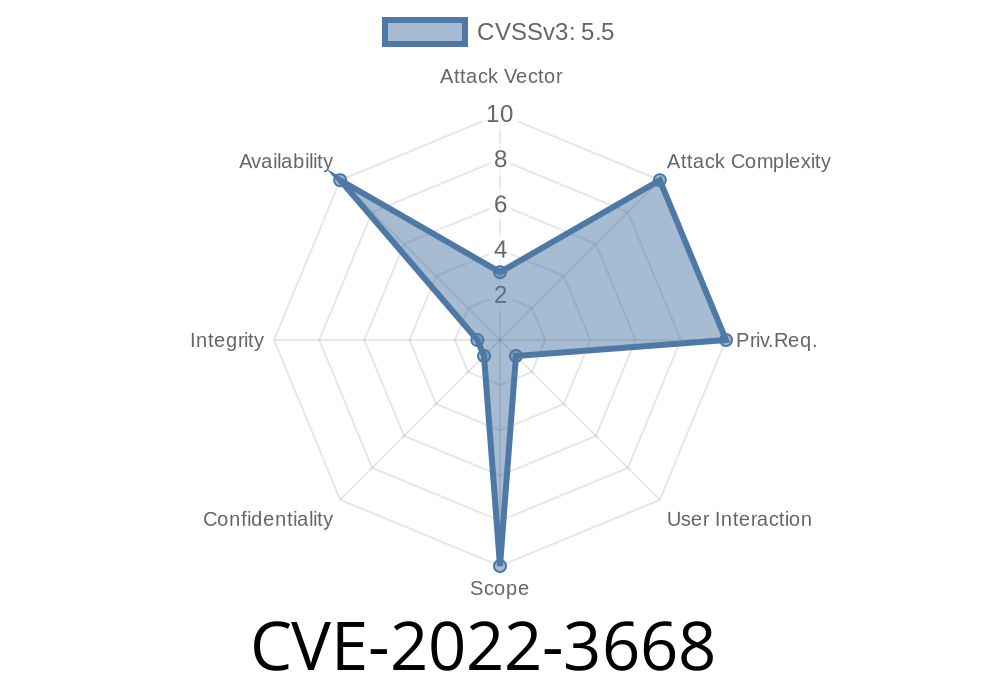A recent vulnerability, identified as CVE-2022-3668 (also catalogued as VDB-212008), has been discovered in the popular open-source multimedia library Axiomatic Bento4. This vulnerability is linked to the mp4edit tool, specifically impacting the AP4_AtomFactory::CreateAtomFromStream function. A successful exploit can cause a memory leak, which could eventually exhaust system resources if abused by a remote attacker. Since the exploit details are already public, understanding the risk, mechanism, and countermeasures is crucial for anyone using Bento4 in their software stack.
What is Bento4?
Bento4 is a widely used, C++ toolkit for reading, writing, encrypting, and modifying MP4 files. Developers use Bento4 to build media manipulation applications, and its tools, like mp4edit, are integrated into many third-party systems.
Public Exploit: Available
- CVE Reference: NVD Details
- Vendor Advisory: Bento4 GitHub
How The Vulnerability Works
The function AP4_AtomFactory::CreateAtomFromStream is responsible for creating MP4 atoms from input streams. If the function receives malformed or attacker-controlled data, it may fail to handle memory allocation and deallocation properly, leading to a memory leak.
This leak could be triggered repeatedly by a remote attacker sending specially crafted MP4 files via APIs, web services, or other systems that utilize the vulnerable Bento4 component. Over time, this can deplete system memory, leading to slowdowns or crashes—effectively a Denial of Service (DoS).
Here’s a simplified version of the problematic code (for educational purposes)
AP4_Result
AP4_AtomFactory::CreateAtomFromStream(
AP4_ByteStream& stream,
AP4_Atom*& atom)
{
AP4_UI32 size, type;
AP4_Result result;
result = stream.ReadUI32(size);
if (AP4_FAILED(result)) return result;
result = stream.ReadUI32(type);
if (AP4_FAILED(result)) return result;
// Atom creation logic
atom = new AP4_GenericAtom(type, size); // memory is allocated
// In case of error, atom may not be properly deallocated
if (/* some error condition */) {
// missing or improper delete atom; leak occurs here
return AP4_ERROR_INVALID_FORMAT;
}
// otherwise do more parsing
return AP4_SUCCESS;
}
The memory leak happens because if an error occurs after new AP4_GenericAtom(), the allocated memory for atom isn’t freed.
Step-by-Step
1. Remote Attacker: Crafts a malicious MP4 file with specific atom structures that trigger errors inside CreateAtomFromStream, but after memory allocation.
2. Delivery: Attacker uploads the file to a target web service or software that uses Bento4 for MP4 processing.
Proof-of-Concept (PoC) Example
A simple python script could automate uploads of specially crafted MP4 to a vulnerable application. The community has published public exploit scripts on GitHub and in exploit archives.
Here’s a minimal illustration (for research – DO NOT use for malicious purposes)
import requests
malicious_mp4_bytes = b"\x00\x00\x00\x20ftyp..." # truncated mp4 header with errors
for i in range(100):
resp = requests.post("https://vulnerable-app.example/upload";, files={"file": ("evil.mp4", malicious_mp4_bytes)})
print(f"Upload {i}: {resp.status_code}")
Each upload could trigger a leak, and hundreds or thousands of requests may cause system resources to run out.
Who is at Risk?
- Web services that process user-uploaded MP4 files, such as video sharing or conversion platforms.
Applications embedding Bento4 for automated MP4 analysis.
- CI/CD pipelines running mp4edit or similar tools on untrusted content.
Upgrade: If a patched Bento4 version is available, always upgrade.
- Patch Yourself: Manually review memory management at all error return sites in AP4_AtomFactory::CreateAtomFromStream. Properly free any allocated memory before returning.
- Limit Input: Restrict access to mp4edit utilities; only allow trusted users to upload and process MP4 files.
References
- NVD entry for CVE-2022-3668
- Bento4 issue tracker reference
- Exploit Database VDB-212008
- Bento4 main page
Final Thoughts
CVE-2022-3668 illustrates how even a small memory management bug in third-party code can open up remote denial-of-service risks for widely used server applications. If you rely on Bento4’s mp4edit, update quickly and monitor your infrastructure for unexpected resource consumption. For interactive applications facing untrusted users, stay watchful for this and other resource exhaustion techniques!
Timeline
Published on: 10/26/2022 19:15:00 UTC
Last modified on: 10/28/2022 15:21:00 UTC
